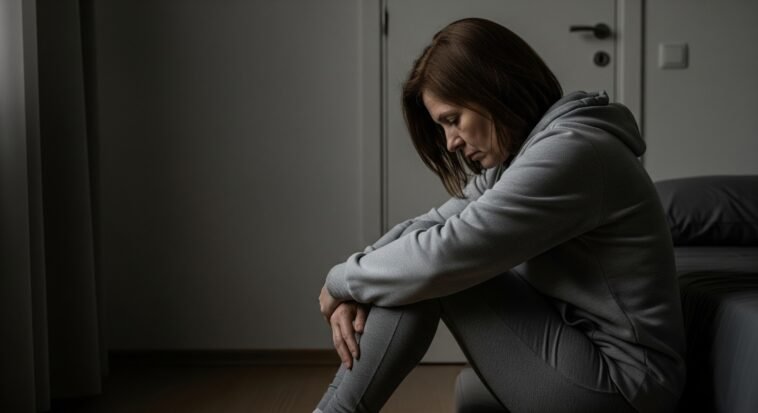
Over 280 million people struggle with depression worldwide—yeah, it’s that big.
And while there’s no single villain in this mental health saga, serotonin—the so-called “happiness chemical”—often gets cast as the lead.
But spoiler: it’s not as simple as “low serotonin = sad.”
This isn’t just brain chemistry 101.
Whether you’re a therapist, someone riding the emotional rollercoaster, or just curious why your mood sometimes feels like it’s written by the writers of Euphoria, understanding how serotonin really works can shift how we think about depression—and how we treat it.
Let’s break down what science actually says about this moody little molecule.
The Serotonin-Depression Connection: What Research Reveals
For years, we were told depression came down to one thing: low serotonin.
It was the OG brain chemistry theory—the “chemical imbalance” idea.
Basically: you’re sad because your brain’s out of serotonin, so take an SSRI (like Prozac) to top it off and feel better. Simple, right?
Except… not so much.
This “serotonin hypothesis” took off in the ’80s and ‘90s like a hit sitcom.
It made sense, especially since meds that boost serotonin seemed to help.
But recent science? It’s calling for a rewrite of the script.
A 2022 mega-review in Molecular Psychiatry went full CSI on decades of research.
Thousands of studies. Tons of data. And the verdict? There’s no solid proof that depression is caused by low serotonin.
Here’s what researchers actually found:
- People with depression don’t consistently have lower serotonin levels.
- Even when scientists lower serotonin on purpose, it doesn’t make healthy people depressed.
- Genes tied to serotonin? They don’t show a clear link to who gets depression.
- Brain scans? All over the place. No clear pattern for serotonin in depressed brains.
So yeah—serotonin might be in the story, but it’s not the main character.
Depression is messier, and blaming it all on one chemical is like blaming the Avengers’ problems on just Loki.
The plot’s way deeper than that.

Understanding the Complexity: Beyond Simple Chemical Imbalance
Turns out, the brain doesn’t run on one lonely “happiness chemical.”
Serotonin isn’t out here working solo—it’s part of a messy group chat of chemicals and brain circuits all talking over each other.
The idea that low serotonin = depression? That’s like saying your phone won’t turn on because one app crashed.
It’s not wrong, but it’s way too simple.
The network effect
Modern brain science says depression’s more like a system-wide Wi-Fi outage than a broken wire.
Serotonin’s in the mix, sure—but so are:
- Dopamine (your brain’s hype man, pushes you to do stuff)
- Norepinephrine (keeps you alert, like mental coffee)
- GABA (chills things out)
- Glutamate (amps things up)
These chemicals don’t work alone—they constantly ping each other in feedback loops.
Mess with one, and you can throw the whole vibe off.
That’s why just boosting serotonin doesn’t always fix the problem.
Neuroplasticity and depression
Here’s where it gets wild. Depression isn’t just about brain chemistry—it’s also about brain wiring.
Your brain is always rewiring itself (that’s called neuroplasticity).
But chronic stress, trauma, or long-term depression can shut that down, especially in key areas like the hippocampus (memory and emotion) and prefrontal cortex (decision-making and control).
Serotonin helps with neuroplasticity, but it doesn’t run the show.
Other players like BDNF (basically Miracle-Gro for neurons), cortisol (stress hormone), and inflammation also decide whether your brain stays flexible or gets stuck in a loop of doom.
How SSRIs Work: Rethinking the Mechanism
Okay, so if low serotonin isn’t the root of depression, then why do SSRIs—aka the “let’s boost your serotonin” meds—actually help some people feel better?
Here’s the twist: it’s probably not just about serotonin.
These meds are doing more than we thought.
Think of SSRIs like that one character on a show who starts off looking one-dimensional, but then five episodes in, they’re saving lives, making plot twists, and crying in the rain.
They’ve got layers.
Potential mechanisms of SSRI action
New research says SSRIs might help by:
- Boosting neuroplasticity (helping your brain rewire and heal)
- Lowering brain inflammation (like an Advil for your neurons)
- Calming your stress system (especially the HPA axis—your body’s stress switchboard)
- Tweaking more than just serotonin (SSRIs mess with dopamine, norepinephrine, and more)
- Changing gene expression (yes, they might literally tell your DNA to chill)
So yeah, SSRIs aren’t just topping off your “feel good” tank.
They’re nudging the whole system in a better direction.
The Placebo Effect and Therapeutic Context
Also—real talk—sometimes just getting help makes a difference.
Regular check-ins, having someone say “you’re not broken,” and the hope that things can improve? That stuff matters. A lot.
The placebo effect isn’t fake—it’s your brain going, “Cool, we’re doing something. Let’s roll with it.”
SSRIs don’t work for everyone, and they’re not magic. But when they help, it’s likely because they’re supporting the brain’s natural ability to reset, rebuild, and ride out the storm.
Implications for Mental Health Treatment
Now that we know depression isn’t just a “low serotonin” glitch, it’s time to retire the old chemical imbalance storyline.
Mental health isn’t a one-button fix—it’s more like a whole dashboard of switches, sliders, and some emotional turbulence.
Moving beyond the chemical imbalance narrative
Mental health pros are moving past the idea that depression = broken brain chemistry. And honestly, thank god.
Here’s why that’s good news:
- You’re not a malfunctioning robot—you’re a human with a complex system reacting to real life.
- It opens the door to treatments that go beyond meds.
- It kills the shame game. Depression isn’t your fault. It’s not just about neurons behaving badly.
- It lets you see progress as more than just “wait for pills to kick in.”
Integrated treatment approaches
Modern treatment is like a team sport. Here’s what’s on the roster:
- Therapy: CBT, interpersonal therapy, or just a good therapist who doesn’t suck—these can be just as effective as meds. Sometimes more.
- Lifestyle stuff: Sleep. Exercise. Stress management. None of it sounds exciting, but your brain runs better when your body’s not in chaos.
- Food matters: Omega-3s, vitamin D, B vitamins—your brain eats that stuff up. Literally.
- Mindfulness & meditation: Not just yoga girl vibes. These actually change your brain’s wiring over time. Like emotional push-ups.
- People: A text from a friend, a hug, a group chat that makes you laugh at 2 AM—social connection is medicine.

The Future of Depression Research and Treatment
Now that we know depression isn’t just a serotonin saga, the research world is leveling up.
Think less “one-size-fits-all” and more Black Mirror—but in a good way.
Personalized medicine
Imagine if your doctor could run a brain checkup and say, “Yep, based on your biology, this treatment’s your best bet.”
That’s where we’re headed.
Scientists are hunting down biomarkers—little biological clues—to figure out who responds best to what.
No more guessing games. No more “try this and wait six weeks.”
Novel therapeutic targets
Researchers are branching out and hitting depression from all angles:
- Inflammation (because your brain can literally get inflamed)
- Stress systems (especially the drama queen of the body: the HPA axis)
- The gut-brain axis (yes, your mood might live in your intestines—wild, right?)
- Sleep cycles (circadian rhythms: your body’s internal clock needs a reset)
- Neuroplasticity (helping your brain grow and adapt, like a mental gym)
These are the real MVPs in the next-gen playbook.
Digital mental health
Therapy’s not just a couch thing anymore.
We’re talking apps that track your mood, VR sessions that teach you to chill, and CBT you can do in pajamas at 2 AM.
Digital tools are making support way more accessible, especially for folks who don’t vibe with traditional setups.

Conclusion
Depression isn’t just a “low serotonin” thing.
That theory had its moment, but the real story is messier—genes, stress, trauma, relationships, sleep, gut stuff… it’s all in the mix.
That doesn’t mean meds like SSRIs don’t help.
They do—for some people.
But they’re just one tool in a much bigger mental health toolbox.
The future? It’s about personalized care, treating the whole person, not just one chemical.
The science is still evolving, but we’ve come a long way.
We’ve got better tools, better insight, and way more empathy. And honestly? That’s a win.



